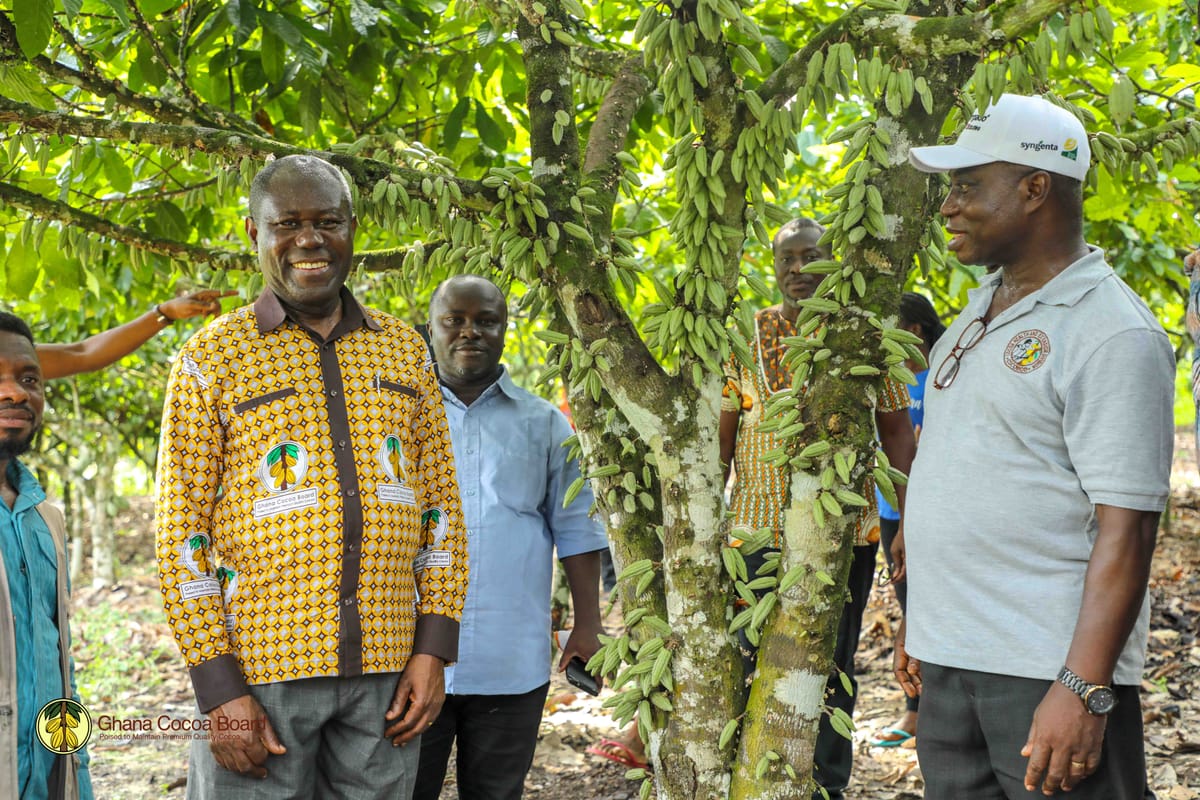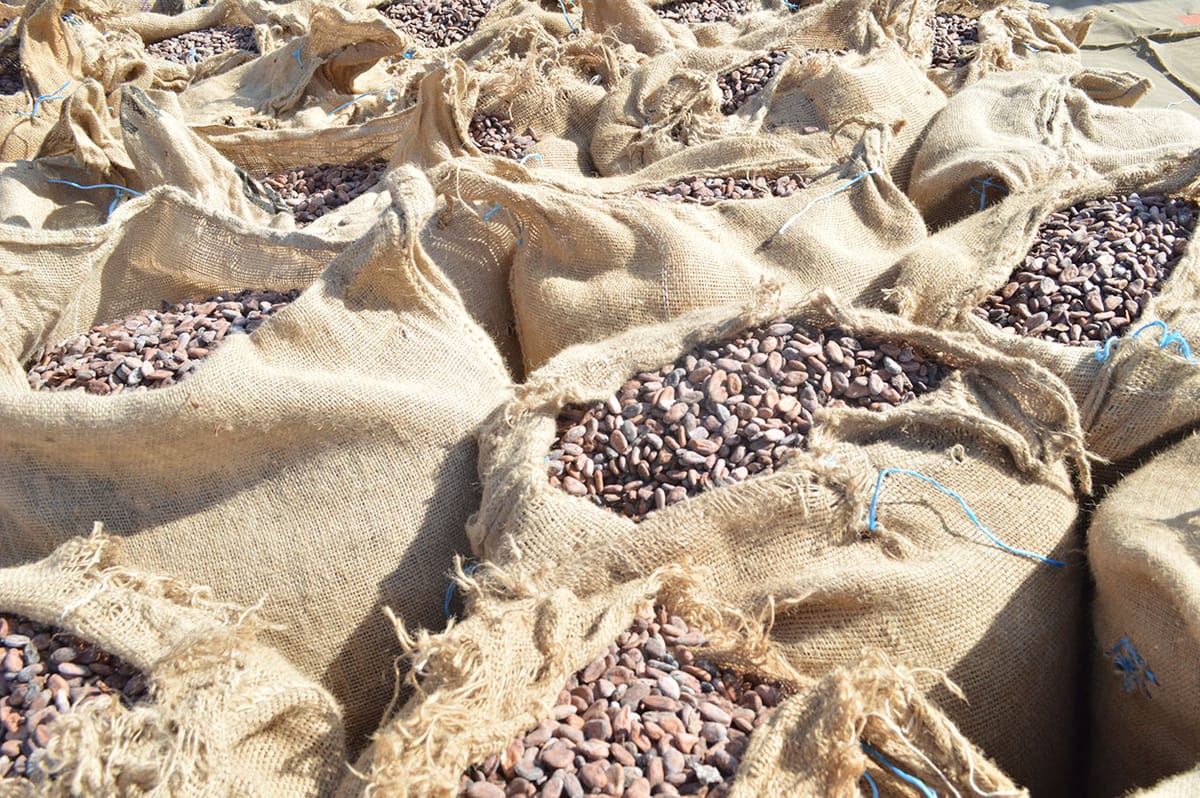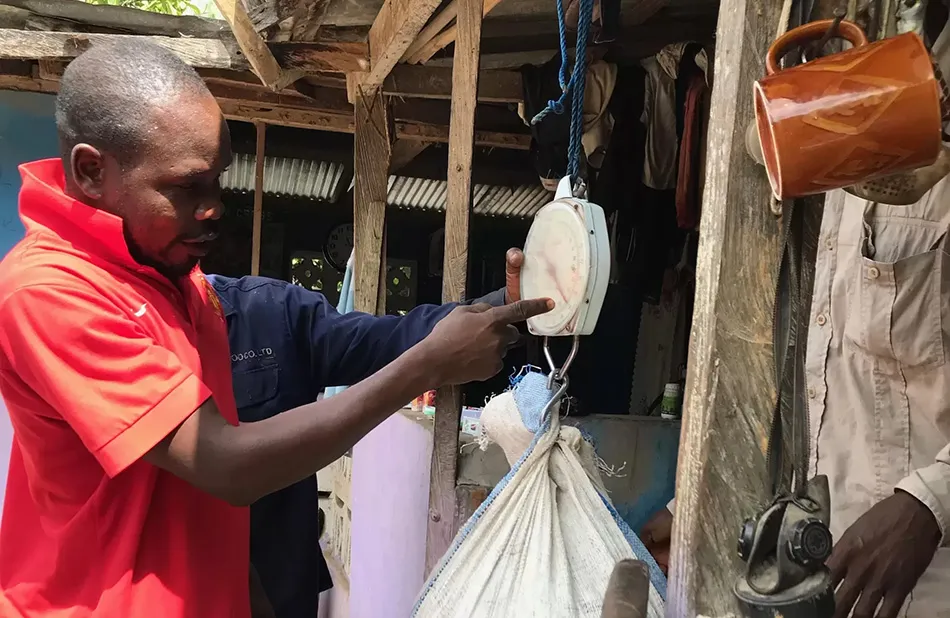A month in, Ghana’s main harvest for 2024-25 is already coming under economic pressure. Reports from the various cocoa trading districts indicate that licensed buying companies (LBCs) struggle to pay cocoa farmers due to locked-up funds for cocoa delivered to Cocobod (the country's regulator).
The Ghana Civil Society Cocoa Platform (GCCP) has flagged the issue to the government, warning of a potential collapse of LBCs, particularly those lacking the financial backing of larger entities. This could significantly destabilise the country’s downstream cocoa supply chain, with catastrophic consequences for smallholder farmers.
“We wish to draw the government’s attention to the possibility of collapsing local licensed buying companies which might not have ‘big brothers’ to pre-finance their purchase.
“The collapse of these local LBCs would greatly destabilise the downstream cocoa supply chain and spell doom for ordinary cocoa farmers who depend on these buyers for their survival,” GCCP said in a statement.
Buying cocoa involves a lot of trust between farmer and purchasing clerk - Dr Kristy Leissle, Founder & CEO, African Cocoa Marketplace
Ghana’s Produce Buying Company racks up losses
The severity of the situation was highlighted earlier this year with a report (seen by cocoaradar.com) on Ghana’s Produce Buying Company (PBC) 's financial performance from 1999 to 2023. The government-run buying company had a monopoly on domestic cocoa purchases until 1994.
The report revealed the company has experienced inconsistent profitability, with several years of significant losses, particularly from 2018 onwards. The period from 2018 to 2023 shows substantial losses, especially in 2018 and 2023, where the losses reached GHS 172 million ($10.78m) and GHS 85 million ($5.33m), respectively.
‘This could be indicative of underlying issues such as poor cost management, decreased demand, or external economic factors,’ the report outlined.
The report highlighted that in 2017, PBC saw peak sales of over GHS 2.3 billion, yet the company posted a net loss of GHS 91 million. This further reinforces the disconnect between revenue generation and profitability.
The drastic drop in 2023 in both sales (to GHS 749,237) and gross profit (to GHS 28,948), along with substantial losses and negative equity, suggests that 2023 might have been a particularly challenging year for PBC Ghana and requires further investigation to understand the root causes of this financial deterioration.
Will the PBC go bust?
The report highlighted the risk of bankruptcy caused by ongoing negative equity from 2018 onwards, especially with the extreme figure of GHS -294 million in 2023. It alleged that if liabilities continue to outpace assets, the company may face bankruptcy risks or need to restructure its finances.
For many years, PBC was a dominant player capturing 30%+ market share for domestic buying, more than any other LBC.
Dr Kristy Leissle, Founder & CEO, African Cocoa Marketplace has extensive experience working in the Ghana cocoa sector. “Buying cocoa involves a lot of trust between farmer and purchasing clerk (the person responsible for buying cocoa from the farmer and paying them for their beans), and PBC had developed those relationships over decades, long before private sector players entered the Ghanaian market for domestic bean purchases in 1994. So PBC was set up for success in a way that the private LBCs were not,” she told cocoaradar.com.
“Reading now about PBC's financial situation, quite frankly, seems to mark the end of an era in Ghana's domestic cocoa market. Having gone from a monopoly over domestic purchasing of beans to commanding the largest market share for years, the current bleak financial state outlined in this report suggests that PBC's dominance has waned, and perhaps their leading position is irrecoverable at this point.”
The role of Cococbod
Analysts argue that Cocobod's decision not to apply for syndicated loans and to go it alone this season has contributed to the financial crisis in the Ghana cocoa sector.

Anthony Aidoo, a Ghana-based cocoa trading executive, told cocoaradar.com: “The season started with no syndicated loan declaration by the regulator; that means licensed buying companies are supposed to mobilise funds and trade this year.
“Industry giants like Ecom, ofi, Barry Callebaut, and Cargill are the leading multinational companies trading and supporting some selected local LBCs for this crop season because of the 'no syndicated loan’ declaration by the regulator.”
He claimed that “tons of cocoa” delivered by these companies and in the name of these companies have not been paid for by the regulator, making them unable to continue trading in the various trading districts.
The GCCP - comprised of Ghanaian civil society actors in the cocoa sector, including NGOs, farmer associations, and community organisations - said farmers are still feeling the effects of the 2023-2024 cocoa season, which it described as “one of the most challenging in recent history.”
The margins received by LBCs and hauliers transporting the beans for LBCs and the price received by cocoa farmers are negotiated within Cocobod’s Producer Price Review Committee (PPRC).
Cocoa carriers strike
At the beginning of this week, cocoa carriers launched a nationwide strike in protest over Cocobod’s failure to increase their fees for handling cocoa beans.
The carriers, represented by the Cocoa Carriers Association(CCA) of Ghana, are demanding an increase in their labour fees from GH¢1.70 to GH¢3 per bag.
The delays in disbursing the cocoa syndicated loan have meant most LBCs, especially the local ones, could not raise capital to purchase cocoa, which led to frustration and disappointment among farmers and carriers who could not get money for their delivered beans.
The GCCP said: “Farmers, in search of money and better prices, smuggled cocoa to neighbouring countries; leading to low volumes of cocoa beans at the Ghanaian ports. The government’s attempt to minimize the smuggling by reviewing farm-gate prices mid-season was too little too late to curb the impact of smuggling.
“Illegal mining activities have severely damaged cocoa farmlands, threatening the lives and livelihoods of farmers and dependents. Unfortunately, no clear and pragmatic strategies have been proposed to tackle this problem that threatens the cocoa industry’s very survival.”
Despite global cocoa prices hitting a record high of US$12,261 per tonne in April 2024 (they are now down to around $7,000 a tonne), cocoa farmers have seen little benefit from these price surges.

Before the start of the main 2024-25 harvest, Cocobod set a farmgate price of 48,000 cedis ($3,070), a 45% increase from last year but significantly less than the 65% rate farmers were demanding.
Analyst Kwame Asamoah Kwarteng, author of @cocoadiaries newsletter and the son of a cocoa farmer, said: “Cocobod acts as the sole buyer and seller of cocoa, leaving farmers with little say in the pricing or selling process. They lack the critical market information and autonomy needed to negotiate prices that reflect the true value of their work.
“This system has turned what should be an empowering model of smallholder farming into one that exploits the farmers it claims to support.
“It is ironic that while Ghana champions smallholder farming, it is not because of a desire to empower these farmers. Instead, smallholder farming has become a tool for the state to control an export product, with profits often directed more toward the administration than the farmers themselves.”
No money for cocoa
Aidoo claimed that local LBCs are now at the mercy of the multinational LBCs. “Cocoa farmers are worried; warehouses and sheds are full of cocoa yet to be paid for by these LBCs, but there is no money to pay for this cocoa.
“Activities at the upstream level are not moving as expected, and there is a lot of pressure on the various trading districts. The government is reluctant to pay back what buyers pay to the LBCs who use their own money to source the cocoa.
“The agreement was to pay the LBCs whenever the buyers pay the regulator.”
- Cocobod was approached for comment and has not responded.
- Disclosure: The author advises ACM on media strategy.



